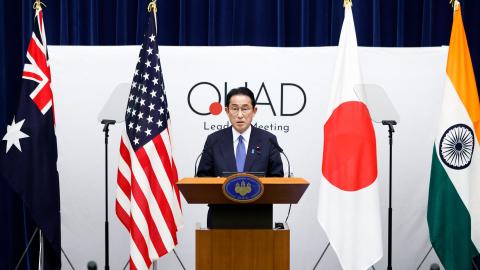Executive Summary
This study is focused on regional order in the Indo-Pacific, as set out in the concept of a free and open Indo-Pacific, and on the policies that the United States, Japan, Australia, India, and European allies have adopted to support this rules-based order in the face of multifaceted challenges posed by the rise of a powerful and assertive China.
This study considers the evolution of the foundational elements of a free and open Indo-Pacific, the conceptual origins as set out in Japanese Prime Minister Shinzo Abe’s first government by Foreign Minister Taro Aso, the increasing alliance-based cooperation between and among alliance partners, the development of alliance-based strategic partnerships across the region, the evolving multilateralism as reflected in the emergence of the Quad (the United States, Japan, Australia, and India), and the increasing engagement of European allies.
The free and open Indo-Pacific—as advanced by Foreign Minister Aso and Prime Minister Abe, and later adopted by the US—set out a framework for regional governance and order based on democracy, freedom, human rights, the rule of law, the market economy, the peaceful resolution of disputes, and opposition to force or coercion to change the status quo.
To support this vision, alliance ties have strengthened across the Indo-Pacific. Today, the US-Japan alliance is at a historic high point, having moved toward the strategic alignment of its respective policy documents. Meanwhile, the US and Australia have made the Indo-Pacific the focal point of the alliance, and Japan-Australia security ties have deepened, as underscored by the 2022 Reciprocal Access Agreement. At the same time, the Quad has engaged on wide-ranging economic and security issues relating to the region in support of a rules-based free and open Indo-Pacific.
And European engagement in the Indo-Pacific has continued to grow, as underscored by the United Kingdom’s “tilt” toward the region and participation in the AUKUS arrangement. Europe’s expanding engagement is well outlined in the Indo-Pacific strategy documents of France, Germany, the Netherlands, and the European Union—all reflecting the recognition of Europe’s growing economic, political, and security interests in the Indo-Pacific.
This study also considers the implication of Russia’s invasion of Ukraine and the response of Western powers for international order in Europe and the Indo-Pacific. Against a background of contemporary doubts about the staying power of the international order, the response of Western democracies, in both Europe and Asia, has been striking in their support of the rules-based international order.
In Europe, NATO’s support for Ukraine has been constant. At the same time, Indo-Pacific allies, concerned about the implications of Ukraine for regional security, have joined in sanctions against Russia. Quad leaders meeting to discuss Ukraine also reaffirmed their support for a free and open Indo-Pacific, with Japan’s Prime Minister Fumio Kishida asserting that challenges to the international order, such as Russia’s invasion of Ukraine, “should not be allowed in the Indo-Pacific.”
The pursuit of a free and open Indo-Pacific order and reaffirmation of a rules-based order in both Asia and Europe now increasingly overlap. Then Foreign Secretary Liz Truss underscored to the Atlantic Council the importance of sustaining Western unity in the face of challenges to the international order—in Europe and in Asia. In her words, “Conflict anywhere threatens security everywhere. The Euro-Atlantic and the Indo-Pacific are indivisible.”
The challenges going forward will be to sustain Western unity to support an international rules-based order—in Asia, this means reinforcing the free and open Indo-Pacific.















